Game Plan Spread
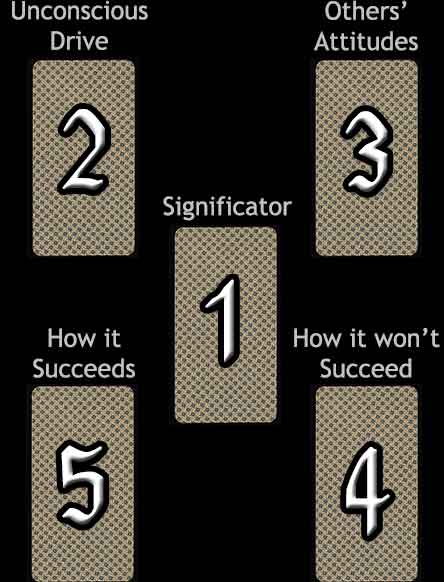
Difficulty: Easy
When a person has a certain plan in mind, this simple five-card spread presents a choice, hinting at what action or attitude should be taken for their plan to succeed, and what should be avoided to help the plan work out for the best.
The initial card is laid in the centre of the layout, the significator. The following four cards are laid out clockwise around the significator.
In this spread, the second card is about what drives the reader, but also says they are not fully conscious of this, perhaps even completely unaware of it. It provides a hint as to the reason they strive for their goal.
The third card uncovers what others think of the reader and their goals. The reader may or may not be aware of this. Sometimes other people factor into the plans (and sometimes they don't).
The fourth card suggests what not to do. If things are permitted to go down this path, the plan will collapse.
The fifth card is a hint as to how to make this plan work out favourably. The idea this card presents should be followed to make the plan successful. It is the differences between Cards #4 & #5 that should be noted, as the differences provide important clues.
Your Game Plan Reading
Unconscious Drive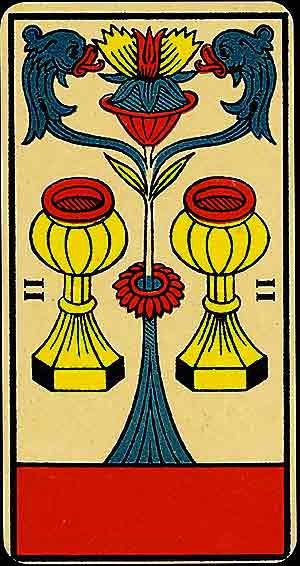 Deuce of Cups |
External Influences Ace of Coins |
|
Significator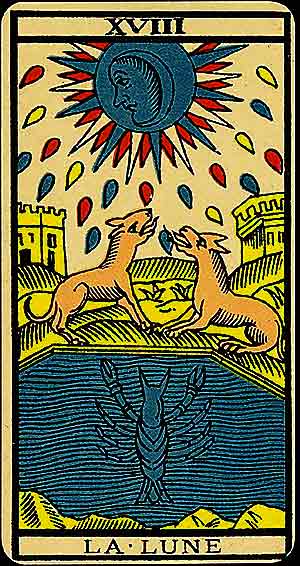 XVIII – The Moon (La Lune) |
||
How it Will Succeed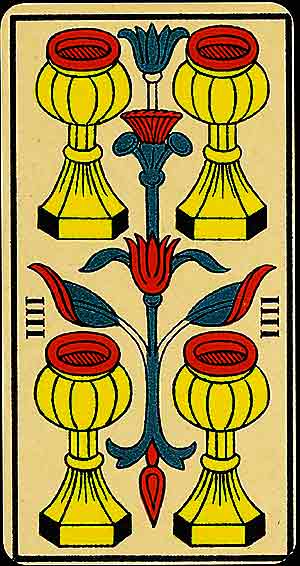 Four of Cups |
How it Will Not Succeed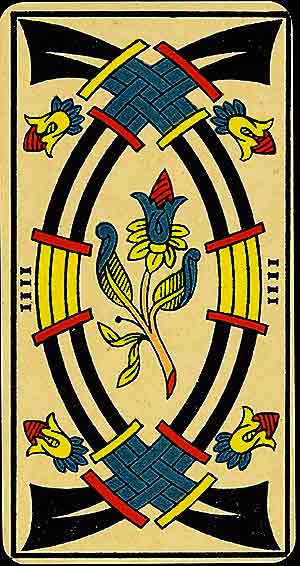 Four of Swords |

XVIII – The Moon (La Lune)
The Moon symbolises intuition, mystery, and the subconscious. It reflects the realm of dreams, illusions, and emotions, inviting you to explore the depths of your psyche and confront hidden truths.
Symbolism: The Moon casts its dim light over a mysterious scene: a dog and a wolf howl beneath its glow, representing the duality of tame and wild instincts. A crayfish emerges from the water, symbolising the hidden depths of the subconscious rising to the surface. The two towers suggest boundaries between reality and the unknown.
In Relationships: Emotional complexity, hidden dynamics, or the need to trust your intuition. Beware of illusions or misunderstandings.
In Work: A period of uncertainty or unclear direction. It encourages careful reflection and trusting inner instincts over external noise.
Spiritually: The Moon calls for introspection and exploration of the shadow self through dreams, intuition, and subconscious symbols.
When ill-dignified: Confusion, deception, or fear of the unknown. It warns against being lost in illusions or succumbing to anxiety.

Deuce of Cups
The Deuce of Cups symbolises emotional unity, balance, and harmonious partnerships. It represents the coming together of energies in love, friendship, or collaboration.
Symbolism: Two elegant cups stand symmetrically, connected by a shared floral motif, symbolising the bond between two entities. The balanced design reflects harmony and mutual respect.
In Relationships: A romantic bond deepens, or a new partnership begins with mutual understanding and affection.
In Work: Collaboration and teamwork thrive, fuelled by shared values and trust.
Spiritually: The card reflects the union of dualities within oneself, urging the seeker to embrace inner harmony.
When ill-dignified: Disconnection, imbalance, or strained partnerships. It warns against selfishness or a lack of reciprocity in relationships.

Ace of Coins
The Ace of Coins symbolises the pure essence of material abundance, stability, and potential. It represents the seed of prosperity and the opportunity to build a strong foundation for success.
Symbolism: A single coin stands at the centre, adorned with floral motifs and a rectangular border. Its design reflects wealth and harmony, suggesting that prosperity is aligned with natural order and balance.
In Relationships: A grounded and stable beginning where trust and security are prioritised.
In Work: A promising opportunity or new venture in the material realm, offering long-term potential for success.
Spiritually: The card reflects alignment with earthly abundance and the ability to manifest your spiritual aspirations in tangible ways.
When ill-dignified: Missed opportunities, greed, or focusing only on material gain. It warns against neglecting deeper values in pursuit of wealth.

Four of Swords
The Four of Swords symbolises rest, recuperation, and mental clarity achieved through stillness. It reflects the need for pause before taking further action.
Symbolism: Four curved swords form an oval frame, with interwoven bindings at the top and bottom, creating a sense of structure and containment. At the centre of the composition, a single blooming flower emerges, symbolising peace, recovery, and renewal. The flowing curves and woven intersections suggest a more organic approach to rest and contemplation. The imagery highlights the importance of finding harmony within stillness, reinforcing the idea that mental clarity arises when balance and inner peace are embraced.
In Relationships: A period of emotional detachment or taking space to reflect on a relationship's direction.
In Work: A time for rest or strategic planning. Progress will come after regrouping and gathering strength.
Spiritually: The card invites retreat into meditation or introspection to realign with higher truths.
When ill-dignified: Stagnation, resistance to rest, or avoidance of necessary reflection. It warns against burnout or neglecting self-care.

Four of Cups
The Four of Cups signifies a moment of refined contemplation, a pause to appreciate the richness present while considering what more could enhance emotional fulfillment. It suggests a life abundant in comforts yet calling for deeper engagement to rediscover true pleasure.
Symbolism: Four cups form a balanced and harmonious structure, symbolising emotional stability and refined satisfaction. Their symmetry suggests a state of ease but also the potential for indulgence to lead to complacency. The imagery encourages a conscious appreciation of luxury and the pursuit of deeper emotional refinement.
In Relationships: A period of emotional contentment that may lead to a desire for something more profound. This is a time to rekindle passion, indulge in shared pleasures, and cultivate the richness of connection.
In Work: A phase of stability and success where motivation must now be fueled by inspiration rather than necessity. Seek new heights of creative fulfilment and elevate your ambitions beyond the merely comfortable.
Spiritually: The card calls for a refined awareness of the beauty and abundance in life. It encourages gratitude, mindfulness, and the pursuit of deeper emotional and spiritual fulfilment beyond material satisfaction.
When ill-dignified: Overindulgence, boredom, or taking things for granted. It warns against becoming too accustomed to comfort and missing the opportunity to elevate life to an even greater level of richness.